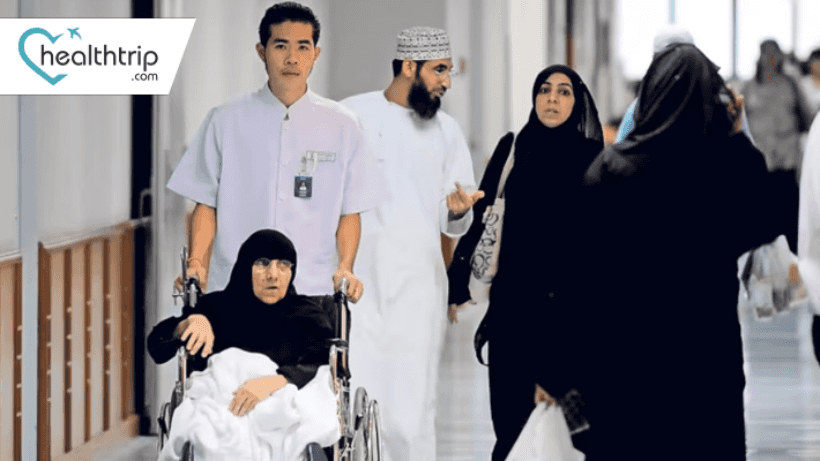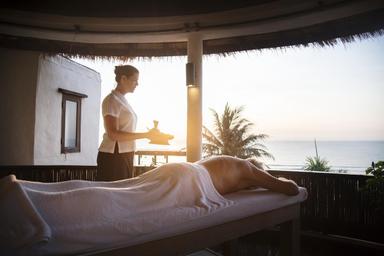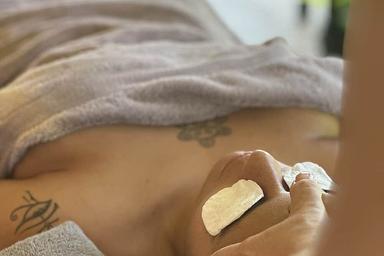
نصائح ثقافية لمرضى الشرق الأوسط في المستشفيات التايلاندية
15 Sep, 2023
مقدمة:
سياحة طبية اكتسبت شعبية هائلة في السنوات الأخيرة ، حيث كانت تايلاند واحدة من أفضل الوجهات للأفراد الذين يبحثون عن خدمات الرعاية الصحية عالية الجودة. ومن بين المجموعة المتنوعة من المرضى الذين يصلون إلى تايلاند، يمثل مرضى الشرق الأوسط مجموعة سكانية كبيرة. بينما تقدم تايلاند مرافق طبية ذات مستوى عالمي وأخصائيي الرعاية الصحية المهرة ، يمكن أن يكون التنقل في الاختلافات الثقافية تحديًا لمرضى الشرق الأوسط. يهدف هذا الدليل إلى تقديم رؤى ونصائح قيمة مرضى الشرق الأوسط الذين يبحثون عن الرعاية الطبية في تايلاند, ضمان تجربة رعاية صحية أكثر راحة ونجاحًا.
الإجراءات الأكثر شعبية في الهند
فهم الاختلافات الثقافية::
1. عوائق اللغة: يمكن أن تشكل اللغة عائقًا كبيرًا عند طلب الرعاية الطبية في بلد أجنبي. في تايلاند ، يتم التحدث باللغة الإنجليزية عادة في المرافق الطبية ؛ ومع ذلك ، قد لا يكون الأمر دائمًا. يمكن للمرضى في الشرق الأوسط الاستفادة من تعلم بعض العبارات التايلاندية الأساسية أو استخدام تطبيقات الترجمة للتواصل بشكل فعال مع مقدمي الرعاية الصحية والموظفين.
2. التواصل غير اللفظي: في ثقافات الشرق الأوسط ، يلعب التواصل غير اللفظي دورًا حيويًا في نقل الاحترام والتفاهم. من الضروري أن تكون على دراية بالاختلافات الثقافية في الإشارات غير اللفظية مثل المصافحة والاتصال بالعين والمساحة الشخصية. في تايلاند، تتضمن التحية التايلاندية التقليدية، "واي"، وضع راحتي اليدين معًا في لفتة تشبه الصلاة والانحناء قليلا. إن فهم مثل هذه الإيماءات والمعاملة بالمثل يمكن أن يساعد في بناء علاقة مع مقدمي الرعاية الصحية التايلانديين.
العلاجات الصحية
امنح نفسك الوقت للاسترخاء
أقل الأسعار مضمونة!

أقل الأسعار مضمونة!
3. توجيه الوقت: غالبًا ما يكون لثقافات الشرق الأوسط مقاربة أكثر استرخاء في الالتزام بالمواعيد والوقت. في المقابل ، تقدر تايلاند الالتزام بالمواعيد والالتزام بالجداول. يجب على مرضى الشرق الأوسط بذل جهد للوصول في الوقت المناسب للتعيينات والالتزام بخطط علاجهم للحفاظ على علاقة إيجابية مع مقدمي الرعاية الصحية.
الآداب الطبية في تايلاند:
1. التواضع: قد يكون لدى مرضى الشرق الأوسط توقعات مختلفة فيما يتعلق بالتواضع في البيئات الطبية. من المهم توصيل تفضيلاتك فيما يتعلق بالملابس والخصوصية إلى مقدمي الرعاية الصحية الخاص بك. تسعى مرافق الرعاية الصحية التايلاندية إلى احترام تواضع المرضى وغالبًا ما توفر الملابس المناسبة إذا لزم الأمر.
2. تفضيلات الجنس: في بعض الثقافات في الشرق الأوسط ، قد يفضل المرضى مقدمي الرعاية الصحية من نفس الجنس. بينما تقدم تايلاند مجموعة من المتخصصين في مجال الرعاية الصحية من الذكور والإناث ، إلا أنه من المستحسن توصيل تفضيلاتك عند تحديد المواعيد لضمان راحتك ورضاك.
3. مشاركة الأسرة: تلعب الأسرة دورًا مهمًا في ثقافات الشرق الأوسط، وغالبًا ما ترافق المرضى إلى المواعيد الطبية. في تايلاند ، من الشائع أن تكون المشاورات الطبية فرديًا بين المريض ومقدم الرعاية الصحية. يجب على مرضى الشرق الأوسط توضيح ما إذا كان يمكن لأفراد الأسرة حضور المواعيد لتجنب أي سوء فهم.
الاعتبارات الدينية:
1. الطعام الحلال: يتبع العديد من مرضى الشرق الأوسط نظامًا غذائيًا حلالًا يلتزم بالقوانين الغذائية الإسلامية. بينما تقدم تايلاند مجموعة متنوعة من خيارات الطعام الحلال ، يجب على المرضى إبلاغ مقدمي الرعاية الصحية بقيودهم الغذائية لضمان التخطيط المناسب للوجبات أثناء الإقامة في المستشفى.
2. مرافق الصلاة: قد يحتاج مرضى الشرق الأوسط إلى الوصول إلى مرافق الصلاة أو سجادات الصلاة لأداء صلواتهم اليومية. استفسر عن توفر هذه المرافق في المستشفى أو المناطق القريبة لاستيعاب ممارساتك الدينية.
3. مكونات الدواء: قد تحتوي بعض الأدوية على مكونات غير مسموح بها بموجب قوانين النظام الغذائي الإسلامي. ناقش أي مخاوف بشأن مكونات الدواء مع مقدم الرعاية الصحية الخاص بك، والذي يمكنه أن يوصي بخيارات بديلة تتوافق مع معتقداتك الدينية.
تخطيط الرعاية الصحية:
1. التأمين والدفع: تأكد من أن لديك تأمين صحي شامل يغطي نفقاتك الطبية في تايلاند. من الضروري فهم شروط بوليصة التأمين الخاصة بك وعملية المطالبة بالسداد. احتفظ بنسخ من جميع السجلات الطبية والفواتير والإيصالات الخاصة بمطالبات التأمين.
2. السجلات الطبية: طلب نسخ من السجلات الطبية الخاصة بك ، بما في ذلك نتائج الاختبار وخطط العلاج ، للاحتفاظ بسجلاتك. سيكون هذا مفيدًا إذا كنت بحاجة إلى متابعة رعاية في بلدك أو ترغب في استشارة مقدم الرعاية الصحية الآخر في المستقبل.
3. التشاور مع المتخصصين: إذا كان لديك حالة طبية محددة تتطلب رعاية متخصصة، فابحث وحدد المتخصصين المناسبين في تايلاند قبل رحلتك. جدولة الاستشارات مقدمًا لتجنب التأخير في علاجك.
التواصل مع مقدمي الرعاية الصحية:
1. اطرح الأسئلة: لا تتردد في طرح الأسئلة وطلب توضيحات حول تشخيصك وخيارات العلاج والنتائج المتوقعة. لقد اعتاد مقدمو الرعاية الصحية التايلانديون على استفسارات المرضى وتقدير التواصل المفتوح.
2. موافقة مستنيرة: تأكد من فهمك وتقديم موافقة مستنيرة على أي إجراءات أو علاجات طبية. اطلب توضيحات باللغة التي تناسبك واطلب وثائق مكتوبة إذا لزم الأمر.
3. الآراء الثانية: إذا كان لديك مخاوف بشأن تشخيصك أو خطة العلاج ، فلديك الحق في البحث عن رأي ثانٍ من مقدم الرعاية الصحية الآخر. ناقش مخاوفك مع مقدم الرعاية الصحية الأساسي الخاص بك لتسهيل العملية.
الحساسية الثقافية:
1. التحلي بالصبر: قد تنشأ سوء الفهم الثقافي ، لكن من الضروري أن تظل صبورًا وفهمًا. يتمتع مقدمو الرعاية الصحية التايلانديون عمومًا بالاحترام وعلى استعداد لاستيعاب الاختلافات الثقافية عندما يتم إعلامهم بها.
2. الامتنان التعبير: يمكن أن يكون التعبير عن الامتنان والتقدير للرعاية التي تتلقاها شوطًا طويلاً في بناء علاقات إيجابية مع مقدمي الرعاية الصحية. كلمة شكر بسيطة باللغة التايلاندية أو لفتة مهذبة يمكن أن يكون لها تأثير كبير.
3. ردود الفعل: إذا واجهت أي حساسية ثقافية أو لديك اقتراحات لتحسين تجربة الرعاية الصحية لمرضى الشرق الأوسط ، فتوفير ردود فعل بناء إلى إدارة مرفق الرعاية الصحية. يمكن أن تساعد مدخلاتك في تحسين تجربة المرضى في المستقبل.
خاتمة:
قد يكون التعامل مع الاختلافات الثقافية عند طلب الرعاية الطبية في تايلاند كمريض من الشرق الأوسط أمرًا صعبًا، ولكن مع الاستعداد والفهم، يمكن التحكم في الأمر تمامًا. من خلال تبني الوعي الثقافي والتواصل الفعال والتخطيط ، يمكن لمرضى الشرق الأوسط ضمان تجربة رعاية صحية إيجابية في تايلاند. يعد هذا الدليل بمثابة جسر بين الثقافات، ويعزز الاحترام المتبادل والتعاون بين المرضى ومقدمي الرعاية الصحية في عالم السياحة الطبية الذي يزداد عولمة.
إقرأ أيضاً:إحصائيات السياحة العلاجية في الهند 2022
المدونات ذات الصلة

Revolutionizing Dialysis Treatment in the UAE
Mediclinic Al Twar Dialysis Center offers advanced dialysis treatment options

Transforming Lives Through Advanced Medical Care at Yashoda Hospitals Hitec City
Yashoda Hospitals Hitec City offers cutting-edge medical facilities and expert

Revitalize Your Health in Dubai: Expert Medical Care at Hortman Clinics
Experience world-class medical care at Hortman Clinics in Dubai, offering

Revolutionizing Healthcare in Kuwait: A Comprehensive Guide
Experience world-class medical care at Dr. Hassan Al-Abdulla Medical Center

Top Doctors of Saudi German: Expert Care for a Healthier You
Get the best medical care from the top doctors at

St. Thomas Hospital: Your Partner in Health and Wellness
Discover the best healthcare experience at St. Thomas Hospital, where










